Nine Things To Know About Numerology 4....

1. Numerology is a Step Sequencer.
At it's core, Numerology is all about building musical phrases by starting with simple patterns
of repeating notes, and then manipulating the pattern with a set of easily applied transformations.
Pattern rate, length, direction, inversion, start & end points, skipped steps, probabilistic jumps
and mutes, these can all be triggered at anytime, and are all setup to be usable while performing.
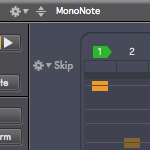 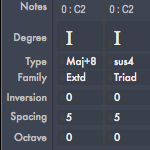 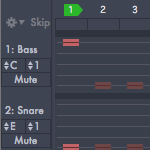 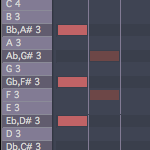
2. Numerology is many Step Sequencers.
Numerology is a modular system, with several kinds of sequencing
modules. There are sequencing modules for mono & polyphonic parts, a drum sequencer that is
configurable from 1 to 16 tracks, A flexible matrix sequencer that also works as
an arpeggiator. And a custom sequencer just for chords -- complete with a smart chord-selection
algorithm.
These are not primitive modules that you have to spend
weeks configuring and routing with other components just to get
something playable. These are full-on MIDI and CV step sequencers
that on their own are more powerful than most hardware sequencers,
while still offering enough flexibility to satisfy even the most
die-hard tweaker.
Complementing those MIDI-based modules are a set of classic CV sequencers for when you
really want to work old-school. Interval & Modulation sequencers generate CV values, but are
tweaked to work comfortably in various roles. There's also a dedicated Gate sequencer for timing
related tasks.
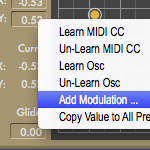  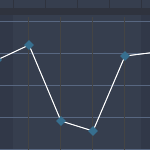 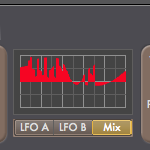
3. Numerology is crazy for modulation.
In Numerology, just about anything can be a modulation target. It is much like
a well-specified synthesizer, but here your modulation targets are compositional parameters:
sequencer rate, length, or direction, velocity or gate adjustments, even individual sequencer step values.
And its super-easy to setup: control-click on any modulatable param, choose 'Add Modulation', tweak a few
options, and you're done.
Like to setup per-step automation of parameters in your favorite synthesizer? No problem. Numerology's
main sequencers all have 3 built-in tracks of modulation that can be targeted to internally hosted
AU Instruments, or (via MIDI CC or NRPN) to synthesizers (hardware or software) located elsewhere.
And that is just the start. You can add as many dedicated modulation sequencers as you like, or
LFO modules, or even Envelopes. Of course, both the LFO's and Envelopes can be configured to
work in beats or bars, so they are easily used as compositional tools. And for a bit of on-the-fly
modulation, Numerology 4's Realtime Automation function, in conjunction with whatever MIDI controller
you have handy, allows you to record short looping segments of automation anytime you like.
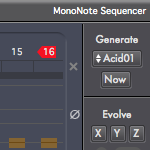 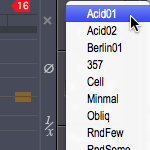 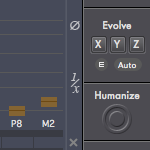 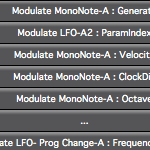
4. Numerology is generative.
Several of Numerology's built-in sequencers include a sophisticated pattern generator and
accompanying 'evolve' actions for creating and manipulating patterns. Both of those actions can
be triggered from other sequencers.
Numerology's CV sequencers and built-in modulation options are also ideal for exploring
any number of generative excursions. Check out the 'JazzSong' and 'Trigger Kick'
demo tracks for a treat.
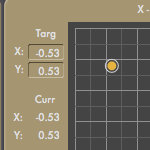 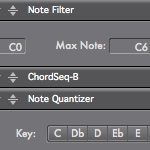  
5. Numerology isn't just about sequencing.
Numerology includes an extensive suite of companion modules that can be mixed and matched with its sequencing
modules to expand their capabilities, but they also make for a very capable audio processing environment. Audio
routing in Numerology is modular, so you can route things around pretty freely -- even setting up feedback if you like.
Also included are a set of flexible audio effects: stereo and ping-pong delays, filters, dynamics, EQ, reverb and ring mod.
All of them are built to respond well to modulation -- filter cutoff, delay time, slew, levels, and so on.
Numerology also hosts AU instruments and FX, so you can include your favorite processing tools.
On the MIDI side of things, there are a full suite of modules for processing and filtering MIDI -- Key splits,
quantization, conversion to and from automation data (a.k.a. CVs), it's all there. For some serious
algorithmic setups, Numerology Pro includes dozens of mathematical functions as well.
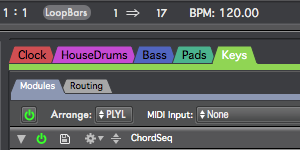 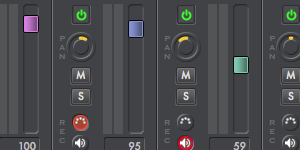
6. Numerology is modular, but structured.
All too often with music software, you have two options: "It's a DAW", which means you get highly structured environment
based around a traditional music studio-- but with many limitations on how things are connected together. Or you can have something fully modular,
and then miss out on some handy things like a proper mixer or options for building arrangments. Numerology
provides a balance between those two worlds: A modular environment, but with enough structure to allow you to build
full compositions with going nuts.
Numerology projects are built up from individual modules that are grouped into stacks. A Numerology stack,
in addition to acting as a container for a set of modules, is also a bit like a track in a DAW: it has a channel
in the mixer, and a track in the
arrangement timeline. Numerology's stacks also come with flexible routing options,
and a sophisticated preset system that makes it easy
to build variations on patterns (and other module parameters, like FX settings and so on). The stack preset
system also provides several options for making either pre-built or live arrangements. Preset changes can be quantized in
beats, bars or custom beat-lengths. Each stack has a built-in preset playlist, and you can also build long-form
arrangements in the timeline.
   
7. Numerology is software that loves to have some hardware around.
It all started with a prod from a user, and a very simple mapping of the Numerology DrumSeq module to
the 64 grid buttons on a Launchpad. It quickly grew to include more than 20 distinct editor
pages for that controller, making Numerology's grid mapping the most flexible, and oddly enough,
the most intuitive of any around. That mapping now extends to supporting multiple grids at
once, including Launchpads of all sorts (original, 'S' & Mini), the Ableton Push and Livid Ohm RBG.
Numerology 4's controller options also include MIDI Learn, generic templates for mixer and transport
controllers, and, for N4 Pro users, extensive OSC control options. All of that flexiblity allows you to
build a hardware control setup that matches your own unique workflow. Should you choose, you can even configure
a system where you rarely need to look at the computer at all.
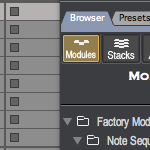  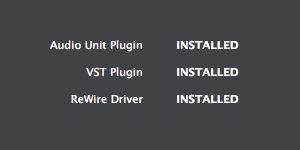
8. Numerology plays well with others.
Other than running as a standlone app,
you can integrate Numerology into your existing studio workflow in a
variety of ways, such as running it as a VST or Audio Unit plugin, or
by using ReWire. With LogicX on Mac OS X Mavericks or later, Numerology
can run as an AU MIDI Effect version of Numerology for super-easy routing.
Numerology also includes built-in recorders for Audio and MIDI so you can
easily track your stuff as you work, and drop it into you DAW of choice later
on for final editing and mixing.
   
9. Numerology comes in two convenient sizes.
Numerology comes in two variants, a Standard Edition for anyone that
wants an economical step sequencing addition to their studio, and a
Pro version with advanced features for users looking to make
Numerology a cornerstone of their compositional workflow. The Pro
version includes these extra features:
- Multi-output support for hosted AudioUnits.
- Automatic plugin delay compensation.
- Per track audio delays for customized delay compensation.
- Monophonic audio routing support.
- OSC (Open Sound Control) support.
- A dedicated dialog for editing MIDI & OSC mappings.
- Custom scale quantization (via the Custom Scale module).
- Several advanced modules for working with CV signals.
- More customization options for the Evolve function.
- Unlimited Undo & Redo w/ Undo History.
If you are primarily interested in using Numerology as a MIDI step
sequencer, then the SE version has everything you need. If, on the
other hand, you like to use CV-based modules to build customized
sequencing setups, or plan to host Audio Unit plugins with multiple
outputs, or use OSC, then go for the Pro version.
What's next? Check out some videos,
download the demo, and join in on the forum!
|